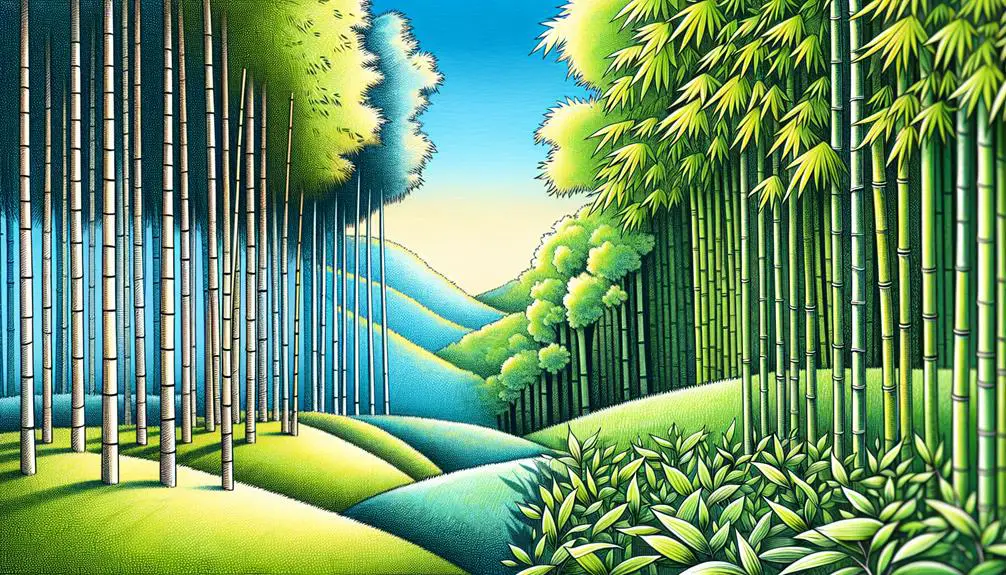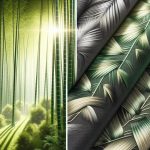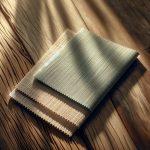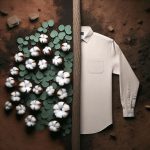I've looked into both bamboo and Tencel to see which one's better for the environment and our wallets. Bamboo grows super fast, doesn't need much water or pesticides, and feels fresh and clean. It's also great for sensitive skin because of its natural bacteria resistance. Tencel, on the other hand, has a super eco-friendly production process that recycles nearly all its solvents and uses less water and energy. It's soft, good for sensitive skin too, and helps out with climate protection. Both have their perks, but if you're leaning towards environmental impact, Tencel might edge out a bit. There's more to unpack here, so hang tight!
Table of Contents
Key Takeaways
- Bamboo grows rapidly and requires minimal water, making it highly sustainable.
- Tencel's closed-loop production recycles over 99% of solvents, enhancing water efficiency.
- Both materials are biodegradable, recyclable, and offer hypoallergenic properties.
- Tencel sheets may cost more but provide long-term durability and less environmental impact.
- Bamboo is generally more affordable and offers natural antibacterial properties.
Understanding Bamboo
Bamboo is a fast-growing grass that becomes fully mature in just 8-10 weeks, offering a sustainable alternative to traditional wood sources. It's a renewable resource that doesn't skimp on benefits. Unlike other plants that need replanting after harvest, bamboo regrows from its own roots. This means less disturbance to the soil and a healthier ecosystem overall.
What's really impressive is how bamboo helps in our fight against climate change. It sequesters a whopping 62 tonnes of CO2 per hectare annually. That's a lot of carbon dioxide being pulled out of our atmosphere! Plus, bamboo plantations use minimal water and don't require pesticides. This significantly reduces the environmental impact compared to conventional farming practices.
Moreover, bamboo's ability to release more oxygen while absorbing more CO2 than traditional trees makes it a real hero for the environment. With all these benefits, it's clear why bamboo isn't just another plant. It's a powerhouse that's paving the way for a more sustainable and environmentally friendly future. So, when we talk about making a positive impact, bamboo is definitely a game changer.
Exploring Tencel
Let's dive into Tencel, another eco-friendly material that's making waves in sustainable fashion and home goods. Tencel, a trademarked version of lyocell, stands out for its environmentally friendly production. The process uses a closed-loop system, recycling over 99% of solvents. It's not just good for the planet; it's great for our wardrobes and bedrooms too.
Made from eucalyptus wood pulp, Tencel offers some fantastic features. It's breathable and moisture-wicking, which means it keeps you cool and dry, whether it's in your jogging outfit or your bed sheets. Its softness and strength make it a go-to for items that need to withstand frequent washing without losing their luxurious feel.
Moreover, Tencel's hypoallergenic qualities make it ideal for sensitive skin. And here's a kicker: it contributes to climate protection projects. By choosing Tencel, you're not just buying a piece of fabric; you're supporting efforts to build climate resilience in vulnerable communities.
Bamboo Benefits
Now, let's talk about how bamboo stands out.
It's an eco-friendly material because it grows super fast and helps keep our soil strong.
Plus, it naturally fights off germs, which is great for anyone with sensitive skin.
Eco-Friendly Material Source
Turning our focus to eco-friendly materials, it's clear that bamboo stands out due to its rapid growth and sustainable harvesting practices.
Bamboo shoots up to its full height in just 8 to 10 weeks and matures in a few years. It naturally regenerates after being cut down, so there's no need for replanting. This makes it super sustainable.
What's more, a bamboo plantation can capture a whopping 62 tonnes of CO2 per hectare each year. That's a big win for our fight against climate change.
Also, bamboo thrives without much water and absolutely no pesticides. So, when we talk about being environmentally friendly, bamboo really takes the cake compared to many other materials, including Tencel.
Natural Antibacterial Properties
Bamboo fabric naturally fights off bacteria, making it a standout choice for hygiene-conscious consumers. It's packed with antibacterial properties that don't just disappear in the wash. This means your clothes, sheets, you name it, stay fresher for longer. Plus, they're odor-resistant. Ever worried about that musty smell on towels or gym clothes? Bamboo's the answer.
And if you've got sensitive skin, bamboo's gentle touch is perfect. It doesn't irritate, and its natural qualities help keep your skin feeling great. So, whether it's bedding or a new tee, bamboo offers that clean, fresh feeling all day. It's not just comfy—it's built for a healthier, cleaner lifestyle.
Tencel Advantages
Now, let's talk about why Tencel is a standout.
It's not just soft on your skin but also kinder to our planet, using far less water and energy.
Plus, its hypoallergenic qualities make it a top pick for anyone with sensitive skin.
Environmental Impact Reduction
In comparing environmental impacts, Tencel stands out with its highly efficient, closed-loop production that recycles over 99% of solvents. This means less waste and pollution, making it a truly sustainable choice. Plus, Tencel's approach supports climate projects, showing real environmental responsibility.
Here's a quick breakdown:
| Aspect | Tencel Advantage | Why It Matters |
|---|---|---|
| Solvent Recycling | Over 99% recycled | Minimizes waste |
| Resource Use | Less water and energy required | Reduces environmental strain |
| Support for Climate | Funds climate protection projects | Helps affected communities |
| Waste and Pollution | Minimized due to closed-loop process | Leads to a greener future |
Choosing Tencel really shows care for our planet. It's about taking action where it counts!
Skin-Friendly Properties
Tencel's skin-friendly qualities make it a top choice for those with sensitive skin. It's incredibly gentle and smooth, which really helps if you're prone to irritations. Plus, it's hypoallergenic. This means it's less likely to cause allergic reactions, keeping your skin calm and happy. The fibers are super soft and they minimize friction, so you won't have to worry about chafing.
Another big plus is Tencel's moisture-wicking capabilities. This keeps your skin dry, cutting down on any discomfort caused by dampness. Since it's also breathable, air flows freely, which reduces sweating. If you've got sensitive skin, or just value comfort, Tencel's a solid bet. It's all about treating your skin right!
Bamboo Drawbacks
While bamboo textiles are popular, they're not without their drawbacks. Let's dive into some issues that might make you think twice.
- Prone to Wrinkling Due to Handling: Bamboo garments can get really wrinkly. If you're not a fan of ironing, this might be a dealbreaker. The fibers just don't hold up well to being tossed around, whether it's in your drawer or during a wash.
- Environmental Concerns with Chemical Processes: The transformation of bamboo into soft textiles isn't always clean. Harsh chemical processes are often used to break down the tough bamboo into something wearable. This not only affects the environment but can also strip away some of the natural benefits bamboo is known for.
- Long-term Durability Issues: After multiple washes, bamboo textiles tend to lose their charm. They may start to feel less soft and lose their moisture-wicking abilities, which are a big part of their initial appeal.
Tencel Limitations
Switching our focus to Tencel, it's important to note that it also has its own set of limitations. First off, if you're not a fan of ironing, you might find Tencel a bit annoying. Tencel sheets are more prone to wrinkling, so they need a bit more TLC to keep them looking crisp. That can be a hassle, especially if you're always on the go.
Another thing to consider is how soft Tencel is. Now, you might think, 'Who doesn't like soft?' But actually, it's softer than some people prefer. This super soft feel isn't everyone's cup of tea, especially if you're the type who likes a bit of crispness to your bedding.
Also, there's the issue of mildew. Tencel's slightly more likely to welcome mildew if it's not cared for properly. This means you've really got to make sure it dries completely after washing. Speaking of washing, Tencel sheets often need specific care, like maybe even hand washing. That's extra time and effort compared to more low-maintenance options.
Environmental Impact Comparison
Let's look at how Tencel and bamboo stack up when we talk about their impact on our planet.
We'll explore their resource consumption rates, how well they break down in nature, and their recycling practices.
It's important to see which one really walks the talk on being green.
Resource Consumption Rates
Considering their environmental impact, Tencel uses significantly less water and energy during production than bamboo. Here's why focusing on resource consumption rates matters:
- Water Usage: Bamboo needs minimal water to grow, but Tencel's production process is more water-efficient, recycling over 99% of solvents.
- Energy Efficiency: Tencel's manufacturing requires less energy compared to bamboo, which contributes to its lower resource consumption.
- Environmental Friendliness: While both materials are eco-friendly, Tencel's closed-loop process makes it superior in terms of minimizing environmental impact.
Biodegradability and Recycling
When it comes to their end-of-life, both bamboo and Tencel stand out as biodegradable and recyclable options, minimizing their environmental footprint. Let's dive into why choosing these materials is a smart move.
| Feature | Bamboo | Tencel |
|---|---|---|
| Biodegradability | High | High |
| Compostable | Yes | Yes |
| Recyclable | Yes | Yes |
| Decomposition | Harmless | Harmless |
| Environmental Benefit | Reduces landfill waste | Reduces landfill waste |
Both materials break down naturally, leaving no harmful residues. They're not just biodegradable; they're also completely compostable. This means they turn into useful compost instead of cluttering up landfills. Opting for either reduces environmental harm significantly.
Care and Maintenance
Caring for Tencel and bamboo sheets differs significantly in terms of effort and cost. I've found that keeping up with the care and maintenance of these materials isn't just about keeping them clean, it's also about preserving their quality and extending their lifespan.
Here's what I learned:
- Machine Wash vs. Hand Wash: Bamboo sheets are a dream when it comes to laundry day. You can toss them in the machine, wash on a gentle cycle, and they come out fine. Tencel sheets, on the other hand, often require a bit more TLC. Sometimes, you may even need to hand wash them to avoid damaging the fibers.
- Drying Techniques: You can throw bamboo sheets in the dryer without much worry. Just use a low heat setting. Tencel sheets, though, might need air drying to prevent shrinkage and maintain the integrity of the fabric.
- Follow Instructions: Always check the labels. Both bamboo and Tencel sheets come with specific washing instructions. Sticking to these guidelines is key to avoid any mishaps and keep your sheets in top condition.
Taking a bit of extra care can really make a difference in how these sheets perform and last over time.
Cost Analysis
I've noticed that while bamboo sheets are more wallet-friendly, Tencel sheets often come with a higher price tag due to their sustainable production. Let's dive into the cost analysis of these two options.
Bamboo is generally cheaper. This makes sense if you're looking to save a bit of money. The thing is, bamboo's affordability doesn't mean it's low quality. It's just less expensive to produce compared to Tencel.
Tencel, on the other hand, costs more. This is largely because the process to source its materials and make it's more eco-friendly. You're paying for the sustainability factor.
Now, even though Tencel sheets might hit your pocket harder initially, it's worth considering their long-term value. They're durable and keep their quality over time. So, you mightn't have to replace them as often as you'd with cheaper sheets.
Sleep Comfort Review
While discussing cost, it's also important to consider how bamboo and Tencel sheets differ in enhancing sleep comfort. I've found that the choice really boils down to your individual needs, especially when it comes to how cool or cozy you prefer your sleeping environment. Here's a quick rundown of what I've experienced with both:
- Cooling Properties: Tencel sheets are a godsend for hot sleepers like me. They're significantly cooler to the touch compared to bamboo, thanks to the eucalyptus fibers. This means on those hot summer nights, Tencel sheets are exactly what I need to keep cool and comfortable.
- Breathability: Bamboo sheets, though not as cool, still offer a great breathable option. They've a slightly brushed feel that's quite nice. They're breathable enough to not trap heat, which is a big plus for me during slightly cooler nights.
- Seasonal Comfort: On colder nights, I've found bamboo sheets to be more suitable. They provide a bit of warmth without being overly stifling, making them a great choice for comfort during the cooler months.
In essence, the choice between Tencel and bamboo sheets for sleep comfort depends on your preference for cooling or a cozy feel.
Frequently Asked Questions
Is Tencel More Expensive Than Bamboo?
Yes, Tencel is generally more expensive than bamboo. It's due to the eco-friendly production and quality of materials. I find the extra cost worth it for the sustainability and luxury Tencel offers.
Is Bamboo or Tencel Better for Eczema?
I'd say both bamboo and Tencel are great for eczema because they're hypoallergenic and breathable. However, Tencel's softer texture might edge it out by reducing skin irritation more effectively.
Is Bamboo Viscose the Same as Tencel?
No, bamboo viscose isn't the same as Tencel. They're made from different materials and have distinct manufacturing processes, which affects their environmental impact and how they feel and perform in use.
Does Tencel Shrink in the Dryer?
Tencel generally doesn't shrink in the dryer due to its durable fibers and moisture management. I've found using a low heat setting keeps my Tencel clothes in great shape without any noticeable shrinkage.
- Tetron Fabric for Marine Applications: Durability and Use Cases - June 18, 2025
- Tetron Fabric for Outdoor Furniture: Weather Resistance and Care - June 18, 2025
- Tetron Fabric for Wall Coverings: Style and Application Tips - June 18, 2025







